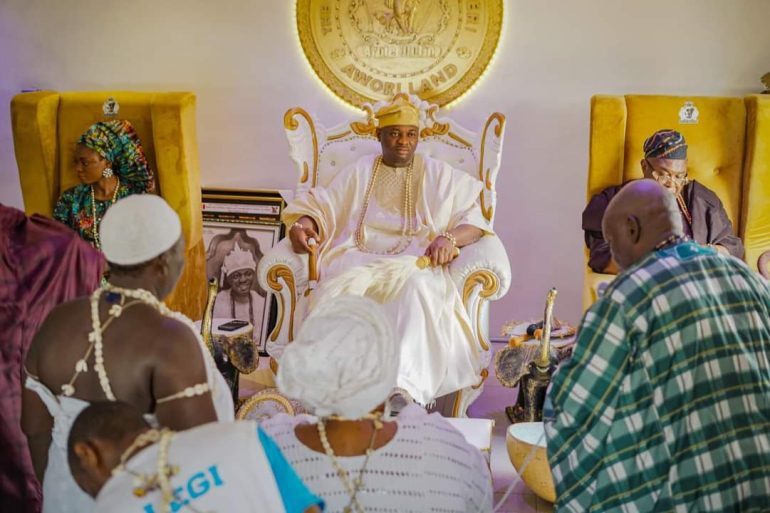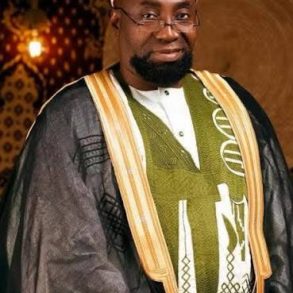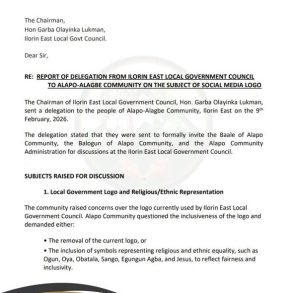“You are very wrong, Aworis are the founders of Lagos”.
The Olofin of Isheri and Adimula of Awori Kingdom, Ọba Sulaimon Bamgbade, on Thursday unequivocally declared that the Aworis were the first people to settle in Lagos.
Ọba Bamgbade urged the Ọba of Benin, Ewuare II to retrace the origin of the Benin Kingdom to Ilé-Ifè, like the Aworis have always done and like the Benin king’s fathers have always done for the greater part of history.
This is coming in response to a recent comment by Ewuare II, who attempted tracing the origin of Lagos to the Binis.
Reacting to the Benin Ọba’s comment in a statement on Thursday, the Olofin said: ” Contrary to Ọba Ewuare’s claims, Lagos was founded and established by Olofin Ogunfuminire Awogunjoye, the progenitor of all Awori people.
“These facts are firmly established and supported by extant literature written by foreign authors and researchers such as Kristin Mann who in his book titled ‘Slavery and Birth of an African City: Lagos 1760- 1900,’ wrote and I quote:
‘‘Migrant fishing people first settled in Lagos and from the beginning water and canoes had a prominent role in the lives of its inhabitants. Prior to the sixteenth century, Aworis, the southernmost of the Yorùbá-speaking people, dispersed from Isheri, a village twelve miles up the Ogun River. A group of them settled at what is now Ebute Metta, on the mainland.
“The need for greater security drove the community to a smaller island in the lagoon opposite Lagos Island. There, they established two settlements, Otto and Iddo, and soon attracted fresh immigrants. In time, people from Iddo moved to the northwestern corner of the larger Island opposite, which eventually became known as Lagos, looking for land to farm.
“The settlers recognised the paramount ruler called the Olofin, based in the more populous community of Iddo, but tracing mythical descent from Isheri and via the founder of that village to Ilé-Ifè, the cradle of Yorùbá civilisation.”
The Awori Ọba further said, “Olofin Ogunfuminire left Ilé-Ifè to settle at Isheri before migrating with his wife, Ajaiye, to present-day Iddo in the heart of Lagos. It was at Iddo that Ajaiye was blessed with the fruits of the womb. Her offspring are the Idejo who became the actual traditional land owners of all Lagos lands.
“The spatial region of the land owned by the Idejo spans from Lagos Mainland (Iddo) to Lagos Island and up to Eti-Osa which he allocated absolutely to his children and other descendants.
“In this regard, he assigned Iru to the Oniru, Ikate to the Elegushi, Lagos Island to Aromire, Iganmu to Ojora, Otto, and the mainland to the Oloto (up to Odo–Iya Alaro). Isheri was the dispersal point where other Olofin Ogunfunminire descendants left to found other Awori towns. For instance, Akeredun left Isheri to establish Igbesa, Odoyi left Isheri to found Agboyi, Osolo and Eleidi Atalabi left Isheri to foundnd Ota.
The Olofin further added:
“The Benin who later came to Lagos as mere traders to take advantage of Lagos’s new found status as a Portuguese trading hub on the coast of West Afric met Olofin and his descendants on the island of Iddo, Èkó and its neighbourhood where they, Benin settled down and were well received and hosted by the community. As time went by, a feud broke out between the Benin trading party and their Awori hosts. Facing imminent defeat, the Bini traders called for reinforcements and assistance from the Ọba of Benin.
Olofin Ogunfunminire and his mentees vehemently and successfully repelled these attacks. As a compromise, and as part of the tolerant disposition which is the character of the typical Awori, the Benins were relocated to live with Idejo Aromire on his pepper farm (Oko Iganran) on Lagos Island at Iga Idungaran ( Iganran in Awori means pepper) where they introduced a more structured organisation on a local Awori prince of Isheri by name Ashipa.






